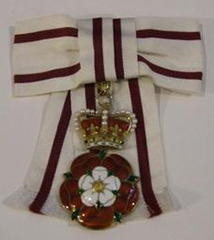
His Majesty's Lord-Lieutenants are the representatives of the Crown for each county in the United Kingdom. They are appointed by The King on the advice of the Prime Minister after extensive consultations within the county. Their foremost duty is to uphold the dignity of the Crown.
The office of Lord-Lieutenant is military in origin and dates from the reign of Henry VIII when its holder was made responsible for the maintenance of order, and for all military measures necessary locally for defence. It was not until 1921 that the Lord-Lieutenant finally lost the power to call on all able-bodied men of the county to fight in case of need. Male Lord-Lieutenants wear a military-style navy blue uniform with scarlet stripes on the trousers and a scarlet band round the peaked cap. Lady Lord-Lieutenants wear a brooch.
The traditional links with the armed forces continue. The Lord-Lieutenant is involved with the North West Reserve Forces and Cadet Association and veterans' organisations such as The Royal British Legion, SSAFA and the Army Benevolent fund. There are links with other uniformed organisations, such as the police, fire and ambulance services and many voluntary bodies such as St John Ambulance, Scouting and Girl Guiding.
From the earliest of days Lord-Lieutenants have always been associated with the magistracy and will normally chair the Lord Chancellor's Local Advisory Committee on Justices of the Peace.
The County of Cumbria comprises the former counties of Cumberland, Westmorland, Lancashire north of the Sands and a part of Yorkshire, and the Lord-Lieutenant's statutory responsibility extends across the whole county.
The Lord-Lieutenant is also "Custos Rotulorum" (Keeper of the Rolls) for their local justice area, with an official responsibility to maintain an accurate record ("The Roll") of all lay justices assigned to the area. In Cumbria the Lord-Lieutenant has by tradition also taken an interest in the Archive Service and heritage of the county.
Lord-Lieutenants are non-political and give their time voluntarily. The role is varied, of which the ceremonial aspect is only one part. Aside from royal duties, Lord-Lieutenants generally promote and encourage voluntary and charitable organisations and take an interest in the business and social life of the county.